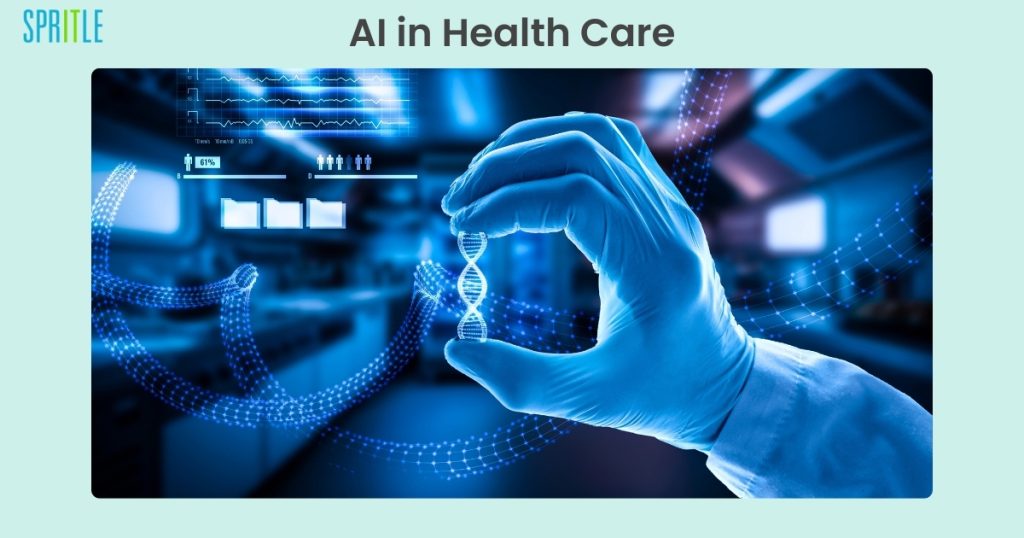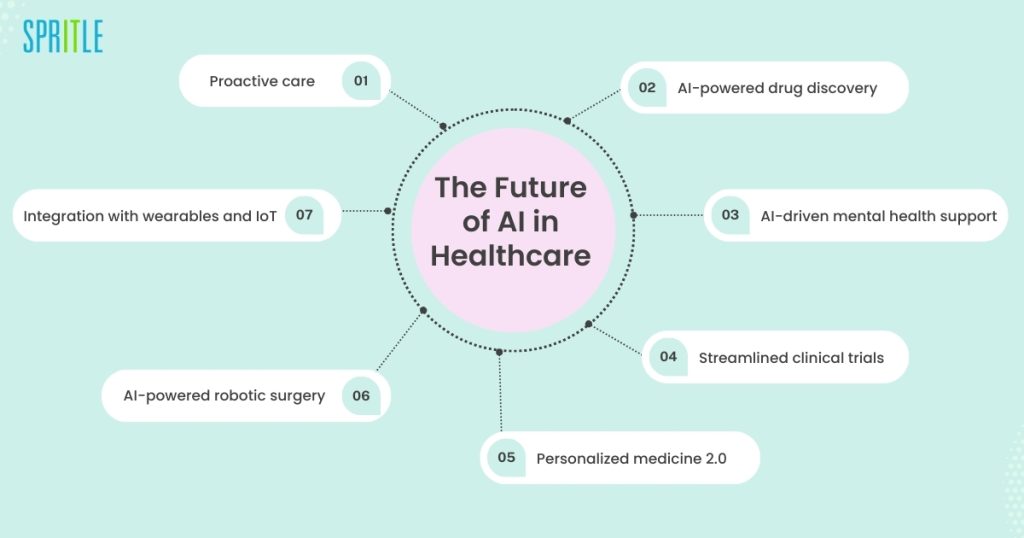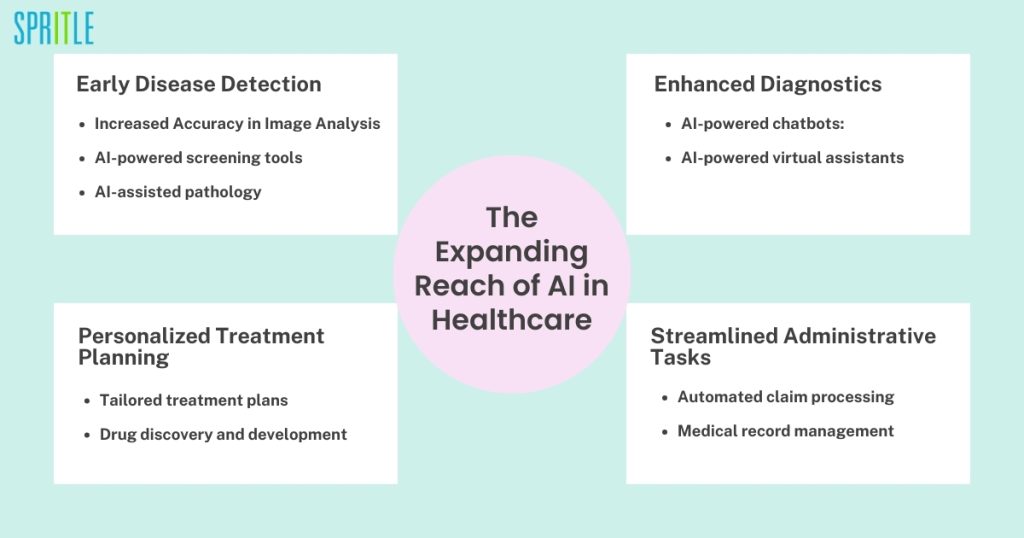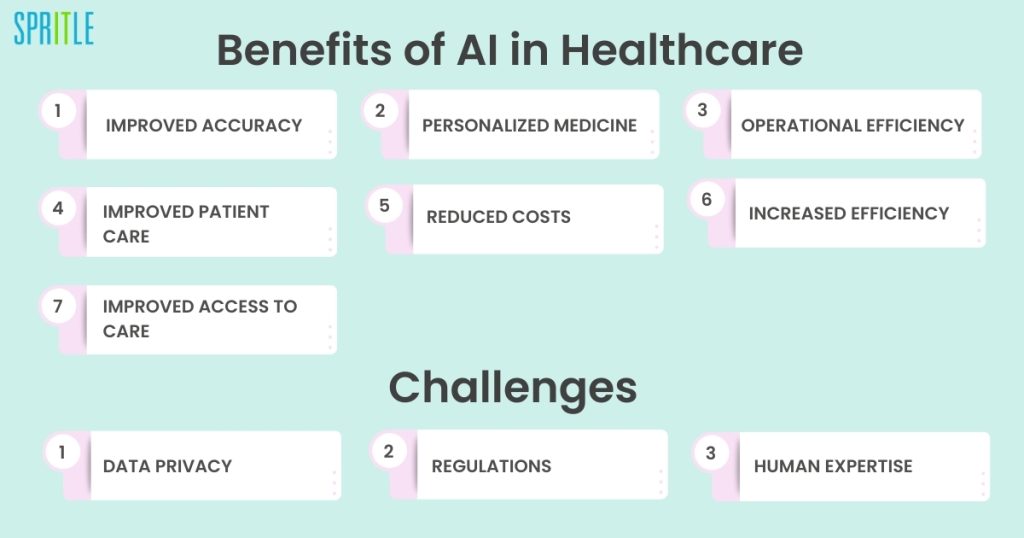Introduction:
Artificial intelligence (AI) is rapidly transforming various aspects of our lives, and healthcare is no exception. This technology holds immense potential to improve diagnosis, treatment, and overall patient care. While some may fear AI replacing human doctors, the reality is that AI in Healthcare can be a powerful tool to augment their capabilities and enhance healthcare delivery.

The Growing Presence of AI in Healthcare:
AI currently plays a multifaceted role in healthcare, offering various applications:
- Faster and more accurate diagnoses: AI can analyze vast amounts of medical data, including medical history, symptoms, and imaging results, to assist doctors in identifying potential illnesses quickly and efficiently.
- Enhanced decision-making: AI tools can provide doctors with evidence-based recommendations, helping them make more informed decisions about treatment plans.
- Personalized care: AI can analyze individual patient data to tailor treatment plans and preventative measures to their specific needs.
How AI Works in Healthcare:
AI utilizes various techniques to achieve its goals in healthcare:
- Machine Learning (ML): AI utilizes sophisticated algorithms that learn from vast amounts of data, identifying patterns and predicting trends.
This allows AI to analyze patient data and medical literature, recommending personalized treatment options and predicting potential complications.
- Deep Learning: A subset of ML, deep learning utilizes artificial neural networks, mimicking the human brain’s structure and learning capabilities.
This enables AI to analyze complex, multi-layered data like medical images and text reports with remarkable accuracy.
AI’s Evolving Role in Healthcare: Shaping the Future of Medicine
The Future of AI in Healthcare:
The future of healthcare depends on AI, with potential to revolutionize how we deliver care, personalize treatment, and enable ground breaking discoveries:
- Proactive care: AI will predict individual health risks, enabling preventative measures before symptoms arise.
- AI-powered drug discovery: Faster development of personalized treatments based on vast data analysis.
- AI-driven mental health support: Chatbots and virtual therapists can offer initial assessments and support.
- Streamlined clinical trials: AI can efficiently identify participants, analyze data, and predict outcomes.
- Personalized medicine 2.0: AI predicts individual responses to treatments for optimal care.
- AI-powered robotic surgery: Robots assist surgeons with high precision and potentially even perform tasks autonomously.
- Integration with wearables and IoT: Real-time health data from wearables will be analyzed by AI for continuous health monitoring and personalized recommendations
Artificial intelligence (AI) is rapidly transforming the healthcare landscape, moving beyond mere hype to deliver tangible improvements in diagnosis, treatment, and patient engagement.
While the fear of AI replacing doctors persists, the reality is that this technology acts as a powerful collaborator, augmenting human expertise and ushering in a new era of personalized, data-driven medicine.

The Expanding Reach of AI in Healthcare:
1. Early Disease Detection:
- Increased Accuracy in Image Analysis: As AI algorithms are now trained to analyze medical images like mammograms, X-rays, and CT scans with increased accuracy, enabling earlier detection of cancers, heart disease, and other diseases.
A recent study showed an AI tool detecting lung nodules 26% faster and finding 29% more previously missed nodules compared to manual analysis, potentially saving lives through early intervention.
- AI-powered screening tools: Companies like Paige and Zebra Medical Vision are developing AI-powered screening tools that automate the analysis of medical images, freeing up radiologists’ time and potentially leading to faster diagnoses.
- AI-assisted pathology: Companies like PathAI are developing AI solutions to assist pathologists in analyzing tissue samples, improving diagnostic accuracy and efficiency.
2. Enhanced Diagnostics:
- AI-powered chatbots: Chatbots like Babylon and Ada are being used to analyze patient symptoms and provide initial diagnoses, reducing the burden on healthcare professionals and offering convenient access to care, especially in underserved areas.
These chatbots often utilize natural language processing (NLP) to understand patient descriptions of their symptoms and provide relevant information and guidance.
- AI-powered virtual assistants: Virtual assistants like Buoy Health and Xprima are being used to answer patient questions, schedule appointments, and provide basic medical advice, reducing unnecessary visits to healthcare providers and improving patient experience.
3. Personalized Treatment Planning:
- Tailored treatment plans: By analyzing individual patient data, including medical history, genetics, and lifestyle factors. AI helps healthcare providers tailor treatment plans to each patient’s unique needs and genetic makeup.
- Drug discovery and development: AI is accelerating drug discovery by analyzing vast datasets and identifying potential drug targets, leading to faster development of new treatments.
4. Streamlined Administrative Tasks:
- Automated claim processing: AI is being used to automate insurance claim processing, reducing administrative burdens for healthcare providers and improving efficiency.
- Medical record management: AI can be used to analyze and organize medical records, making it easier for healthcare providers to access relevant patient information and improve the quality of care.

Some prominent examples of AI companies providing services in healthcare:
AI in Healthcare: Early Disease Detection and Diagnosis
- Paige : Utilizes AI to analyze medical images for early cancer detection.
- Zebra Medical Vision : AI-powered platform for automating medical image analysis across various specialties.
- PathAI : Develops AI solutions to assist pathologists in analyzing tissue samples for improved diagnostics.
- Babylon & Ada : AI-powered chatbots providing initial diagnoses and health information.
Personalized Treatment Planning and Drug Discovery:
- Oncora : Develops AI platforms for personalized radiation therapy in cancer treatment.
- BenevolentAI : Utilizes AI for identifying new treatments for various diseases.
- Atomwise: Uses AI to design and develop new drugs.
- Insilico Medicine : Leverages AI for drug discovery and development.
Remote Patient Monitoring and Management:
- Fitbit : Offers AI-powered wearables that monitor vital signs and health metrics.
- Apple : Develops AI-powered health features in its wearable devices and smartphones.
- Teladoc & Doctor on Demand : Telehealth platforms utilizing AI to facilitate remote consultations and virtual care.
Other Applications:
- Verily : Develops AI tools to predict potential health issues like heart disease and kidney disease.
- DeepMind Health : Focuses on applying AI to various healthcare challenges, including retinal disease and language impairment.
- Intuitive Surgical : Develops AI-powered robotic surgery systems to assist surgeons in complex procedures.
- Medtronic : Develops AI-powered solutions for various medical applications, including cardiac rhythm management and surgical navigation.
This list represents a small selection of companies actively shaping the healthcare landscape with AI. Therefore AI in healthcare, Numerous other companies are contributing to this revolution, and the field is constantly evolving.
It’s crucial to note that this list is not exhaustive and should not be considered an endorsement of any particular company.
Benefits and Challenges of AI in healthcare:
- Improved Accuracy: AI can analyze data with superior speed and precision compared to humans, leading to more accurate diagnoses and reduced medical errors.
- Personalized Medicine: AI personalizes healthcare by tailoring treatment plans and preventative measures to individual patients, improving effectiveness and patient outcomes.
- Operational Efficiency: AI can streamline administrative tasks in healthcare, freeing up valuable time for healthcare professionals to focus on patient care.
- Improved patient care: AI can be used to collect and analyze patient data, identify patterns, and develop personalized treatment plans. This can lead to better outcomes for patients.
- Reduced costs: AI can be used to automate tasks that are currently performed by human workers, which can lead to cost savings.
- Increased efficiency: AI can be used to speed up processes, such as the diagnosis of diseases and the development of new drugs. This can lead to a more efficient healthcare system.
- Enhanced safety: AI can be used to detect errors and prevent accidents, which can lead to a safer healthcare environment.
- Improved access to care: AI can be used to provide healthcare services in remote areas, which can improve access to care for people who live in rural areas or who have limited transportation options.
Challenges and Considerations:
- Data Privacy: Ensuring responsible data collection, storage, and access is crucial to protect patient privacy and mitigate potential biases in AI algorithms.
- Regulations: Clear guidelines and regulations are needed to ensure the safe and ethical use of AI in healthcare.
- Human Expertise: Collaboration and trust between healthcare professionals and AI are essential to ensure optimal patient care and navigate ethical considerations.

Conclusion:
AI is not a replacement for human healthcare professionals but rather a powerful tool to enhance their capabilities. With responsible development and implementation, AI has the potential to revolutionize healthcare and improve patient care significantly.
AI is no longer a futuristic prospect but a tangible reality shaping the future of healthcare. By embracing responsible development and implementation, this technology holds immense potential to revolutionize healthcare, empowering healthcare professionals and improving patient care significantly.
As AI continues to evolve, we can expect even more transformative applications in the years to come. However, it is crucial to address the challenges of data privacy, regulations, and ethical considerations to ensure the safe and effective use of AI in healthcare. Above all ,By fostering collaboration between AI developers, healthcare professionals, and policymakers, we can harness the power of AI to create a future of personalized, accessible, and efficient healthcare for all.
